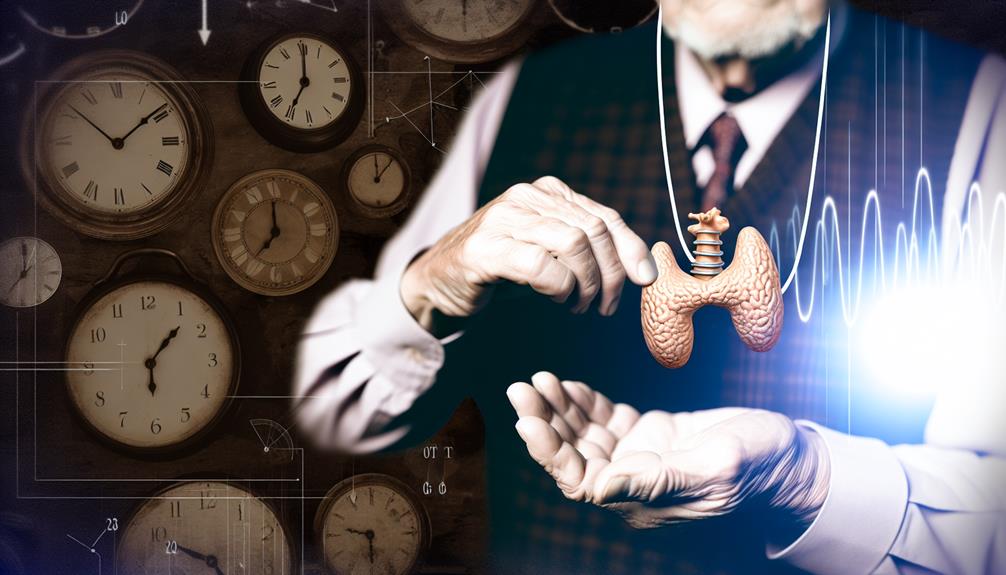As I observe the hormonal shifts in men over 50, I notice a marked decline in testosterone levels, dropping about 1% each year. This reduction can lead to decreased energy, libido, and muscle mass. I also see that estrogen levels may rise due to increased body fat, resulting in an imbalance that contributes to mood swings and weight gain. Additionally, cortisol production often becomes less regulated, possibly heightening stress responses. Reduced growth hormone and thyroid function further complicate metabolism and energy levels. Understanding these changes is critical for maneuvering this transition phase effectively, and more detailed insights await.
Testosterone Levels Decline

As men reach the milestone of 50, the phenomenon of testosterone decline becomes increasingly apparent. This decline, often subtle at first, can manifest in various ways, including decreased energy levels, diminished libido, and reduced muscle mass. Research indicates that testosterone levels typically decrease by about 1% per year after reaching peak levels in early adulthood. Understanding this decline is essential for men who wish to maintain their vitality and overall health.
In my analysis, I've found that testosterone replacement therapy (TRT) has emerged as a potential solution for those experiencing significant symptoms related to low testosterone levels. TRT can involve various modalities, such as injections, patches, or gels, tailored to individual needs. However, it's important to approach this option cautiously. Consulting with a healthcare professional is imperative to assess the risks and benefits adequately.
Moreover, lifestyle modifications play an important role in managing testosterone levels. Regular exercise, particularly resistance training, has shown promise in naturally boosting testosterone. In addition, a balanced diet rich in healthy fats, proteins, and micronutrients can support hormonal health. Adequate sleep and stress management are also essential, as both can adversely affect testosterone levels.
Increased Estrogen Levels
Increased estrogen levels can be an unexpected change for men over 50, often overshadowed by the focus on declining testosterone. As I explore this issue, I recognize that estrogen isn't just a female hormone; it's essential for men too. However, when estrogen levels rise disproportionately, we encounter what's known as estrogen dominance. This phenomenon can disrupt hormonal balance, leading to a range of health concerns that deserve attention.
In my experience, many men notice symptoms such as increased body fat, mood swings, and diminished libido as they grapple with these hormonal changes. It's important to understand that estrogen and testosterone work in tandem to maintain our overall well-being. When testosterone declines and estrogen rises, the resulting imbalance can exacerbate the effects of aging.
I've observed that lifestyle factors, including diet, exercise, and stress, can greatly influence estrogen levels. For instance, an increase in body fat can lead to higher estrogen production, as adipose tissue converts testosterone into estrogen. As a result, maintaining a healthy weight is essential for promoting hormonal balance.
Moreover, exposure to environmental estrogens—found in certain plastics and chemicals—can further complicate this situation. Addressing these factors is important for mitigating the effects of estrogen dominance. By fostering awareness and taking proactive steps, we can better manage our hormonal health and ultimately improve our quality of life as we age.
Changes in Cortisol Production

Estrogen dominance isn't the only hormonal change men over 50 face; alterations in cortisol production can also play a significant role in overall health. Cortisol, often referred to as the "stress hormone," helps regulate various bodily functions including metabolism, immune response, and blood pressure. As we age, the body's ability to maintain cortisol regulation can decline, leading to potential health consequences.
Here are three key aspects of cortisol changes that I've found particularly significant:
- Increased Stress Response: With age, my body may not handle stress as efficiently, resulting in elevated cortisol levels. This prolonged stress can contribute to anxiety and mood disorders.
- Weight Management Challenges: High cortisol levels can lead to increased fat accumulation, especially around the abdomen. This change in body composition has been something I've personally noticed, making weight management more challenging.
- Impact on Sleep Quality: Elevated cortisol can disrupt sleep patterns, leading to insomnia or poor-quality sleep. I've noticed that managing stress through mindfulness or relaxation techniques has become increasingly important for my overall well-being.
Understanding these changes in cortisol production is essential for effective stress management. By focusing on lifestyle adjustments—like regular exercise, a balanced diet, and adequate sleep—I can better support my body's hormonal balance and promote healthier aging. As I navigate these changes, maintaining awareness of cortisol regulation has become vital for my overall health strategy.
Growth Hormone Reduction
As men age, particularly after 50, I often observe a significant reduction in growth hormone levels, which can profoundly affect muscle mass. This decline not only contributes to muscle atrophy but also alters metabolic processes, making it harder to maintain a healthy weight. Understanding these changes is essential for developing effective strategies to mitigate their impact.
Impact on Muscle Mass
With age, the decline in growth hormone levels can considerably affect muscle mass in men over 50. I've noticed that this reduction impacts not just muscle size but also overall strength and recovery. It's vital to understand how these hormonal changes can manifest in our daily lives.
Here are three key effects of reduced growth hormone on muscle mass:
- Decreased Muscle Protein Synthesis: Lower levels of growth hormone result in diminished muscle protein synthesis, which is essential for building and maintaining muscle mass.
- Slower Muscle Recovery: With reduced growth hormone, recovery times after strength training sessions can lengthen, making it harder to bounce back from workouts and hindering progress.
- Increased Fat Accumulation: The decline in muscle mass often leads to a higher body fat percentage, which can affect strength and overall physical performance.
To combat these challenges, it's important to prioritize strength training and focus on strategies that enhance muscle recovery. By understanding the impact of growth hormone reduction, I can make informed choices that help maintain muscle health as I age.
Effects on Metabolism
Significant hormonal changes after 50 can lead to notable effects on metabolism, particularly due to the reduction of growth hormone levels. As I've observed in my own experience, this decline directly impacts my metabolic rate and energy expenditure. Growth hormone plays an essential role in regulating body composition, and its decrease often results in increased fat accumulation and decreased muscle mass.
With lower growth hormone levels, I've noticed that my body burns calories less efficiently, leading to a slower metabolic rate. This change means that even if I maintain my caloric intake, I'm more likely to gain weight. Additionally, the energy expenditure during physical activity seems diminished, making it harder to sustain the same level of fitness I once had.
I've also realized that this hormonal shift may necessitate adjustments in my diet and exercise routine. Incorporating more strength training can help counteract muscle loss, and being mindful of my nutritional choices can optimize my energy levels. Understanding these metabolic changes has empowered me to make informed decisions about my health and wellness as I navigate the complexities of aging.
Diminished Thyroid Function

As men age, diminished thyroid function can greatly impact metabolism, leading to weight gain and decreased energy levels. I've observed that symptoms of hypothyroidism, such as fatigue and depression, often manifest subtly but can profoundly affect overall well-being. Understanding the treatment options available is essential for effectively managing these hormonal changes.
Impact on Metabolism
Diminished thyroid function can profoundly affect metabolism in men over 50. As our thyroid hormones decline, the consequences on metabolic rate and energy expenditure become increasingly evident. I've noticed that these changes can lead to several critical factors that warrant attention:
- Reduced Metabolic Rate: A lower production of thyroid hormones often results in a decrease in metabolic rate, making it more challenging to maintain or lose weight.
- Increased Fatigue: With a slowed metabolism, energy expenditure diminishes, leading to feelings of fatigue and a lack of motivation for physical activity.
- Altered Nutrient Utilization: Diminished thyroid function can impact how efficiently our bodies utilize nutrients, potentially leading to imbalances and deficiencies.
Understanding these shifts is essential for men over 50, as they can greatly influence overall health and well-being. By recognizing and addressing diminished thyroid function, we can take proactive steps to manage our metabolism and maintain a healthier lifestyle. Keeping an eye on these changes allows for better-informed decisions regarding diet and exercise, ultimately promoting a more balanced life as we age.
Symptoms of Hypothyroidism
The relationship between metabolic changes and thyroid function becomes clearer when examining the symptoms of hypothyroidism. As I've observed in my practice, many men over 50 report a range of fatigue symptoms that can considerably impact their daily lives. This condition often manifests as a persistent lack of energy, making even routine tasks feel intimidating.
Moreover, it's not uncommon for individuals to experience unexplained weight gain. This increase in body weight is typically due to a slowed metabolism, a direct result of diminished thyroid function. The thyroid gland plays an essential role in regulating metabolic processes, and when its hormone production falters, the body's ability to burn calories efficiently declines.
Additionally, other symptoms may accompany fatigue and weight gain, such as sensitivity to cold, hair loss, and changes in mood. These manifestations highlight the importance of recognizing hypothyroidism as a potential underlying issue for men in this age group. Addressing these symptoms promptly can lead to more informed discussions about health and wellness, ultimately guiding us toward effective solutions. Understanding these signs is the first step in taking control of our health as we age.
Treatment Options Available
When it comes to managing diminished thyroid function, several effective treatment options are available that can greatly improve quality of life. As I've explored these options, I've found that a combination of approaches often yields the best results. Here are three primary strategies:
- Hormone Replacement: Thyroid hormone replacement therapy, such as levothyroxine, can help restore normal hormone levels and alleviate symptoms. Regular medical consultations guarantee the right dosage.
- Lifestyle Modifications: Implementing lifestyle changes can be vital. This includes dietary changes like incorporating iodine-rich foods and selenium supplementation, and adopting exercise regimens that promote overall health.
- Stress Management and Alternative Therapies: Managing stress through techniques like mindfulness or yoga has proven beneficial. Additionally, some may find relief through alternative therapies, such as acupuncture or herbal treatments, though these should be approached with caution and discussed with healthcare providers.
I've found that integrating these elements not only supports thyroid function but also enhances overall well-being. Regular monitoring and collaboration with healthcare professionals are indispensable to tailor an effective treatment plan that suits individual needs.
Insulin Sensitivity Changes
As men reach the age of 50 and beyond, insulin sensitivity often begins to decline, impacting glucose metabolism and overall health. This decline can lead to increased insulin resistance, a condition where the body's cells respond poorly to insulin, making it harder to regulate blood sugar levels. I've noticed that as I age, my body's ability to efficiently use insulin diminishes, which can create a cascade of health issues if not addressed.
Insulin resistance is a significant concern because it can lead to elevated blood sugar levels over time. When my cells become less responsive to insulin, the pancreas compensates by producing more insulin, which can eventually exhaust this essential organ. This process may not only increase my risk of developing type 2 diabetes but also contribute to other metabolic disorders.
Maintaining insulin sensitivity is critical for overall wellness, especially as I continue to age. I've found that lifestyle choices play a important role in managing this decline. Regular exercise, a balanced diet rich in fiber, and maintaining a healthy weight are strategies that can help improve insulin sensitivity. Additionally, monitoring my blood sugar levels has become more important than ever, allowing me to gauge how well my body is managing glucose.
Effects on Libido

Declining testosterone levels often lead to noticeable changes in libido for men over 50. As I navigate this phase of life, I've observed that these hormonal shifts can greatly affect sexual health. Understanding these effects can help in seeking effective libido enhancement strategies.
Here are three key impacts I've identified:
- Reduced Sexual Desire: Many men experience a marked decrease in sexual desire, which can be frustrating and concerning. This decline can stem from lower testosterone levels, which are essential for maintaining libido.
- Changes in Sexual Function: Alongside reduced desire, men may also face challenges with sexual performance. This can manifest as difficulty achieving or maintaining an erection, further complicating intimate relationships.
- Emotional Factors: Psychological aspects play a role too. Anxiety about sexual performance or feelings of inadequacy can compound the physical effects of lowered testosterone, creating a feedback loop that exacerbates the issue.
Addressing these changes is important for maintaining not just sexual health but overall well-being. Exploring options for libido enhancement, such as lifestyle modifications, medical interventions, or counseling, can make a considerable difference. It's essential to consult with healthcare professionals to tailor a strategy that suits individual needs. By understanding and confronting these hormonal changes head-on, I aim to reclaim a satisfying sexual life, ensuring that age doesn't define my sexual energy.
Impact on Mood and Energy
Significant hormonal changes can profoundly impact mood and energy levels for men over 50. As testosterone levels decline, I've noticed that mood swings have become more frequent and pronounced. These fluctuations can lead to irritability and even feelings of sadness, which can affect my emotional health. It's essential to recognize that these changes, while often overlooked, are significant and deserve attention.
Energy fluctuations are another common issue. I find that some days I feel motivated and clear-headed, while other days I struggle to maintain focus and enthusiasm. This inconsistency can disrupt my daily activities and affect my relationships. Sleep quality, which often deteriorates with age, plays a vital role in this. Poor sleep can exacerbate both mood and energy levels, creating a cycle that's hard to break.
To mitigate these challenges, I've embraced lifestyle adjustments that promote better stress management and enhance my overall well-being. Regular exercise has proven effective in stabilizing my mood and boosting energy. Additionally, maintaining social connections has been invaluable; sharing experiences with friends provides support and fosters emotional resilience.
Ultimately, addressing these hormonal changes requires awareness and proactive strategies. By prioritizing mental clarity and investing in emotional health, I can navigate this phase of life more effectively. It's about making informed choices and understanding how these hormonal shifts can impact my daily experience.
Frequently Asked Questions
How Can Diet Influence Hormonal Changes in Men Over 50?
I've found that diet markedly influences hormonal changes, especially testosterone levels. Incorporating healthy dietary fats can help maintain these levels, while managing sugar intake is vital for hormone regulation. I've also noticed that nutrient timing, like consuming protein sources around workouts, can enhance muscle recovery and support hormonal balance. Including more plant-based foods in my meals has been beneficial too, providing essential nutrients that support overall health and hormone production.
Are There Natural Supplements to Support Hormonal Balance?
I've found that natural supplements can indeed support hormonal balance. Herbal remedies like ashwagandha and fenugreek have shown promise in promoting hormonal health. Additionally, nutritional support through vitamins D and B can enhance overall well-being. It's essential to consult with a healthcare professional before starting any regimen, as individual needs vary. By combining these approaches, I believe we can foster a more balanced hormonal environment safely and effectively.
What Role Does Exercise Play in Managing Hormonal Changes?
Exercise feels like a compass guiding me through hormonal shifts. I've found that strength training builds not just muscle but also resilience against imbalances. It's like adding iron to my foundation. Meanwhile, cardiovascular fitness keeps my heart and mind in sync, enhancing overall well-being. Together, they create a harmonious balance that helps manage these changes. It's a powerful partnership that supports my body and boosts my confidence as I navigate this journey.
How Can Sleep Quality Affect Hormone Levels in Older Men?
I've noticed that sleep quality greatly impacts hormone levels. Sleep deprivation disrupts my circadian rhythm, leading to hormonal imbalances. It's fascinating how this affects testosterone levels and melatonin production. Poor sleep heightens my stress response, exacerbating aging effects. When I prioritize recovery quality through better sleep, I feel a notable difference in my energy and mood. Understanding this connection has motivated me to improve my sleep habits for better hormonal health.
What Are the Long-Term Effects of Hormonal Changes on Overall Health?
Imagine a clock slowly ticking, each tick representing a hormonal shift. As testosterone declines and estrogen increases, I've noticed libido changes, muscle loss, and mood fluctuations. These subtle alterations can feel like shadows growing longer in the late afternoon sun. The metabolic slowdown creeps in, affecting energy levels and overall vigor. The long-term effects of these changes are profound, whispering reminders that maintaining balance is essential for my health and well-being as I age.
